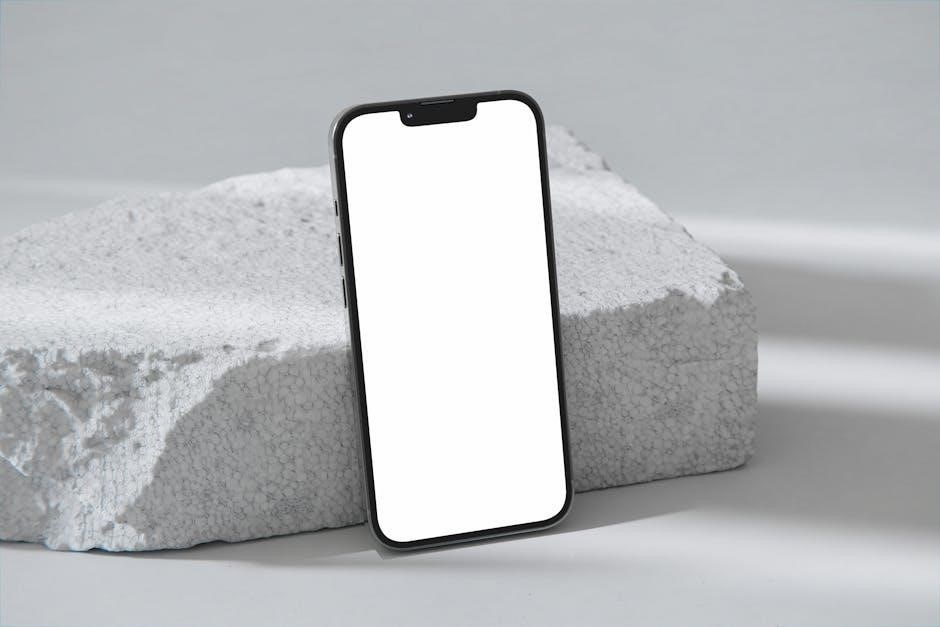Le Futur Simple is a French tense used to express actions occurring in the future. It is essential for communicating planned events or predictions. Regular and irregular verbs follow specific conjugation rules, with many resources like PDF exercises available for practice and mastery.
Definition and Usage
Le Futur Simple is a French tense used to describe actions that will occur in the future. It expresses planned events, predictions, or intentions. Formed with infinitive endings like -ai, -as, -a, -ons, -ez, -ont, it applies to both regular and irregular verbs. This tense is essential for communicating future plans or uncertainties, such as “Je vais visiter Paris” (I will visit Paris). Its usage is vast, covering specific and general future contexts, making it a cornerstone of French communication.
Importance in French Grammar
Le Futur Simple holds significant importance in French grammar as it allows speakers to express future events with clarity. It is essential for discussing plans, predictions, and future intentions, enabling effective communication. Mastery of this tense enhances fluency and accuracy in both spoken and written French. Regular practice with exercises, such as those found in PDF worksheets, helps learners grasp its conjugation rules and usage, making it a fundamental skill for proficiency in the language.
Conjugation Rules for Regular Verbs
Regular verbs in Le Futur Simple are categorized into -er, -ir, and -re groups, each with specific endings. The stem is derived from the infinitive, and endings are added accordingly.
Formation of Le Futur Simple
Le Futur Simple is formed by adding specific endings to the infinitive stem of the verb. For regular verbs, endings are -ai, -as, -a, -ons, -ez, and -ont for -er, -ir, and -re verbs. Irregular verbs often have unique stems and endings. For example, “être” becomes “serai, seras, sera,” and “avoir” becomes “aurai, auras, aura.” Regular verbs follow predictable patterns, while irregular verbs require memorization. Practice with exercises helps master both types, ensuring correct usage in sentences.
Examples of Regular Verbs
Regular verbs in Le Futur Simple follow predictable patterns. For -er verbs, like “parler” (to speak), endings are added directly: je parlerai, tu parleras, il parlera, nous parlerons, vous parlerez, ils parleront. Similarly, -ir verbs like “finir” (to finish) become je finirai, tu finiras, il finira, nous finirons, vous finirez, ils finiront. For -re verbs, such as “vendre” (to sell), the endings are je vendrai, tu vendras, il vendra, nous vendrons, vous vendrez, ils vendront. These examples demonstrate the consistent conjugation rules for regular verbs in Le Futur Simple.

Conjugation of Irregular Verbs
Common Irregular Verbs in Le Futur Simple
Irregular verbs in Le Futur Simple include essential verbs like “être,” “avoir,” and “aller.” For example, “je serai, tu seras, il sera” for “être,” and “j’aurai, tu auras, il aura” for “avoir.” Other common irregular verbs are “faire” (I will do), “voir” (I will see), “prendre” (I will take), and “venir” (I will come). These verbs deviate from standard conjugation patterns and must be memorized. Practice exercises, such as fill-in-the-blank and multiple-choice quizzes, are available in PDF format to help master these verbs.
Spelling Changes in Irregular Verbs
Some irregular verbs in Le Futur Simple undergo spelling changes to maintain pronunciation or follow specific patterns. For example, “venir” (to come) becomes “je viendrai,” with the stem “viendr-.” Similarly, “tenir” (to hold) changes to “je tiendrai.” Certain verbs like “pouvoir” (to be able) add letters, becoming “pourrai.” These changes often involve adding or doubling consonants, such as in “manger” (to eat), which becomes “je mangerai.” PDF exercises provide drills to practice these unique spelling adjustments, helping learners master irregular verb conjugation in the future tense.

Practical Exercises in PDF Format

Downloadable PDFs offer exercises like fill-in-the-blank, multiple choice, and sentence completion tasks to practice Le Futur Simple. These resources are ideal for all learning levels and printable.
Fill-in-the-Blank Exercises
Fill-in-the-blank exercises are an effective way to practice conjugating verbs in Le Futur Simple. These exercises typically provide sentences with missing verbs, which students must complete correctly. For example: “Je ______ (visiter) Paris l’année prochaine.” Students choose the correct form of the verb in parentheses. Such exercises help reinforce verb conjugation rules and sentence structure. Many PDF worksheets include themed sentences, making practice engaging and relevant to real-life scenarios. Regular practice with these exercises improves accuracy and confidence in using Le Futur Simple.
Multiple Choice Questions
Multiple choice questions are another popular format for practicing Le Futur Simple. These exercises present a sentence with a blank and several verb options, requiring students to select the correct conjugation. For example: “Nous ______ (faire) nos devoirs demain.” Options might include “faisons,” “ferons,” or “feront.” This format tests recognition of correct conjugations and helps identify common errors. Many PDF resources include MCQs, making them a versatile tool for self-assessment and reinforcing grammar rules in an engaging way.
Sentence Completion Tasks
Sentence completion tasks are effective for practicing Le Futur Simple. Students fill in the blanks with the correct form of the verb in the future tense. For example: “Demain, je ______ (aller) au parc avec mes amis.” Options or context may be provided to guide learners. These exercises improve conjugation accuracy and reinforce grammar rules. Many PDF worksheets include such activities, making them a practical way to apply knowledge and build confidence in using Le Futur Simple in realistic scenarios.

Advanced Exercises for Mastery
Advanced exercises challenge learners to apply Le Futur Simple in complex contexts. Translate English sentences to French using the future tense and create original sentences with irregular verbs. These tasks refine mastery and enhance fluency in using Le Futur Simple effectively in various scenarios, ensuring comprehensive understanding and practical application of French grammar rules through diverse and engaging activities.
Translation Exercises from English to French
Translation exercises from English to French are an excellent way to master Le Futur Simple. These tasks involve converting English sentences into French, focusing on accurate conjugation and proper use of future tense. For example, translating “We will visit Paris next year” to “Nous visiterons Paris l’année prochaine.” Such exercises help learners practice irregular verbs, sentence structure, and context-specific vocabulary. They also improve fluency and reinforce grammar rules, making them a valuable tool for advanced learners seeking to refine their French language skills through practical application.
Creating Sentences with Le Futur Simple
Creating sentences with Le Futur Simple helps reinforce its usage in real-life scenarios. Learners can practice by describing future plans, such as “Je vais visiter Paris l’année prochaine” or “Nous achèterons une maison.” Using irregular verbs like “Je ferai mes devoirs demain” or “Ils vendront leur voiture” enhances fluency. These exercises encourage creative application of grammar rules, making them an engaging way to master the tense and build confidence in French communication skills through practical sentence construction.

Resources for Le Futur Simple
Downloadable PDF worksheets offer conjugation exercises, sentence completion tasks, and translation drills to master Le Futur Simple. Online platforms provide additional practice opportunities for learners to refine their skills.
Recommended PDF Worksheets
Various PDF worksheets are available, offering structured exercises like fill-in-the-blanks, verb conjugations, and sentence completions. These resources focus on both regular and irregular verbs, providing clear examples and practical tasks. They are ideal for self-study, allowing learners to track progress and reinforce understanding of Le Futur Simple. Many worksheets include answers for self-correction, making them valuable tools for effective practice.
Online Platforms for Practice
Online platforms offer interactive exercises and quizzes to master Le Futur Simple. Websites like Reverso, Quizlet, and FranceTV provide comprehensive resources. Many platforms include interactive verb conjugation drills, multiple-choice questions, and sentence completion tasks. They often feature progress tracking and immediate feedback, enhancing learning efficiency. These tools are accessible anytime, making them ideal for flexible practice. They cater to all levels, from beginners to advanced learners, ensuring a tailored experience for improving French grammar skills.
Mastery of Le Futur Simple enhances French communication. Regular practice with PDF exercises and online tools ensures confidence in forming future tense verbs accurately and effectively.

Le Futur Simple is a fundamental French tense for expressing future actions. It involves specific conjugation rules for both regular and irregular verbs. numerous PDF exercises, such as fill-in-the-blank, multiple choice, and sentence completion tasks, are available to practice mastery. These resources, along with translation exercises, help learners confidently use Le Futur Simple in real-life contexts. Consistent practice with these materials ensures a strong understanding of the tense, enabling effective communication about future events and plans.
Encouragement for Further Practice
Mastering Le Futur Simple requires consistent practice. Utilize PDF worksheets and online platforms to reinforce conjugation skills and build confidence. Regularly completing exercises like fill-in-the-blanks and sentence completions will enhance your ability to communicate future plans effectively. Embrace challenges and gradually increase difficulty to ensure long-term proficiency. Dedication and persistent practice are key to achieving fluency in using Le Futur Simple in various contexts, making it an invaluable tool for expressing future events in French.